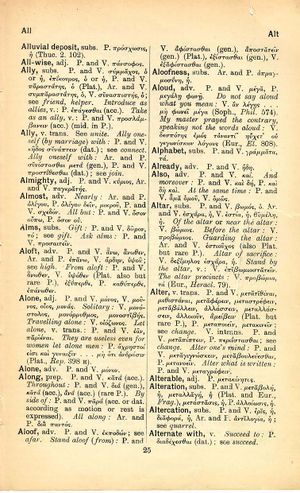altar
Ὥσπερ αὐτοῦ τοῦ ἡλίου μὴ ὄντος καυστικοῦ, ἀλλ' οὔσης ζωτικῆς καὶ ζωοποιοῦ θέρμης ἐν αὐτῷ καὶ ἀπλήκτου, ὁ ἀὴρ παθητικῶς δέχεται τὸ ἀπ' αὐτοῦ ϕῶς καὶ καυστικῶς· οὕτως οὖν ἁρμονίας οὔσης ἐν αὐτοῖς τινὸς καὶ ἑτέρου εἴδους ϕωνῆς ἡμεῖς παθητικῶς ἀκούομεν → Just as although the Sun itself does not cause burning but has a heat in it that is life-giving, life-engendering, and mild, the air receives light from it by being affected and burned, so also although there is a certain harmony and a different kind of voice in them, we hear it by being affected.
English > Greek (Woodhouse)
subs.
P. and V. βωμός, ὁ. Ar. and V. ἐσχάρα, ἡ, V. ἑστία, ἡ, θυμέλη, ἡ.
Of the altar or near the altar: V. βώμιος.
Before the allar: V. προβώμιος.
Guarding the altar: Ar. and V. ἑστιοῦχος (also Plat. but rare P.).
Altar of sacrifice: V. δεξίμηλος ἐσχάρα, ἡ.
Stand by the altar, v.: V. ἐπιβωμιοστατεῖν.
The altar precincts: V. προβώμια, τά (Eur., Heracl. 79).
Latin > English (Lewis & Short)
altar: and altāre, āris, n., v. altaria.
Latin > French (Gaffiot 2016)
altar,¹⁰ āris, n., c. altare.
Latin > German (Georges)
altar u. altāre. s. altaria.

